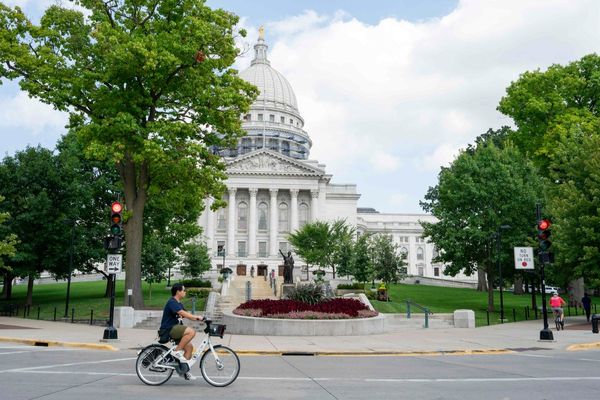PHILADELPHIA — Two days after a 15-year-old boy was shot outside a North Philadelphia recreation center, city and state officials on Friday announced a new partnership to bring trauma therapy into rec centers and summer camps in some of the city’s most violent neighborhoods.
The Center for Families and Relationships, a Philadelphia-based nonprofit outpatient mental health provider, received a $999,000 violence reduction grant from the Pennsylvania Commission on Crime and Delinquency to bring trauma-informed therapy and workshops to six rec centers and 12 summer camps over the next two years.
The grant will pay for two therapists, each of whom will work with three centers, and a case manager, who will help people connect with available resources in the community.
In each of the six rec centers, trauma therapists will offer weekly open office hours, individual therapy sessions, monthly group workshops for the community, and monthly group training for staff. The offerings could be available as early as this June.
On Friday afternoon, city and state officials including Mayor Jim Kenney and Lt. Gov. Austin Davis were joined by community leaders at Tustin Recreation Center in Overbrook to roll out the initiative.
City Councilmember Curtis Jones Jr., who represents Overbrook, said the program is an important step toward breaking the culture of dealing with trauma in silence.
Jones grew up in West Philadelphia and said he witnessed violence in his neighborhood. But at the time, the expectation was that young Black men would not seek help.
“I’m excited about it no longer being in vogue to suffer in silence,” Jones said.
The other recreational centers involved in the program are: Feltonville Recreation Center in Feltonville, Rumph-Mallery Recreation Center in Mount Airy, Cecil B. Moore Recreation Center in North Philadelphia, Mander Playground in Strawberry Mansion, and 8th and Diamond Playground in North Philadelphia.
Last year in Philadelphia 217 children were shot — the most of any year in recent history, according to police statistics. But the toll of gun violence is much broader: Witnessing a shooting, losing a friend or family member, or living in a neighborhood that feels unsafe can be traumatic and cause long-term emotional health problems if untreated.
Of the recreation centers that will participate in the program, 8th and Diamond Playground has experienced the most violence in recent years. There have been 16 shootings within a 500-foot radius since 2015, an Inquirer analysis found.
The new programs will be available to anyone who has been affected by gun violence to help them cope with post-traumatic stress, said Jordan Brogan, chief executive of the Center for Families and Relationships.
“That literally could be someone who have been shot, someone who witnessed a shooting, someone who lost a loved one due to gun violence, or really anyone who feels they’ve been directly impacted by gun violence,” she said.
Brogan hopes the program will contribute to a healing process that helps more children, adults, and entire families process the trauma they experienced.
In the long term, she believes that could also prevent shootings. People with unresolved trauma often struggle to regulate their emotions, and conflict may more quickly spiral into violence, Brogan said.
The therapists in the recreation centers will use methods such as Trauma Focused Cognitive Behavioral Therapy that help people over a period of eight to 12 weeks to think about the root of their trauma and process it.
Currently there is no consistent trauma support in recreational centers, said Kathryn Ott Lovell, the city’s commissioner of the Department of Parks and Recreation. The city often makes counselors available at rec centers the day after a shooting, but then they leave, she said.
This is the first time that rec centers will get embedded therapists who will provide consistent care at a time of unprecedented violence. There were nearly 300 shootings around recreation centers and playgrounds since 2019, according to Parks and Recreation.
“Rec centers, playgrounds — they used to be sacred,” said Ott Lovell. “That changed.”
The program will also offer training for recreation center staff, who are often the first to respond to a shooting outside their doors. They, too, are at risk of gun violence and experience trauma from exposure to it.
Last fall, Parks and Recreation staffer Tiffany Fletcher was killed by a stray bullet while maintaining the pool at Mill Creek recreation center in West Philadelphia. A 14-year-old was charged with her slaying.
For too many young people, being shot or losing a loved one to gun violence seems normal, said Sheldon Robinson, a neighborhood resident who volunteers in Tustin Recreational Center in Overbrook and runs programs for kids and youth.
“That’s not normal, to be shot at. To be shot. That’s nowhere near normal. That should be dramatic,” Robinson tells the youth he works with. “It’s not supposed to be another day. ‘I got over it.’”
This week, he asked one of the four teens who were shot in November near Overbrook High School if they were receiving counseling.
“What is that?” Robinson recalled the boy asking him.
Robinson said he hopes having easily accessible mental health resources will change the culture and encourage young people to open up.
“It’s something we never had,” Robinson said. “I know it’s going to reach multiple people and multiple families. I know it.”
(Graphics editor John Duchneskie contributed to this article.)






